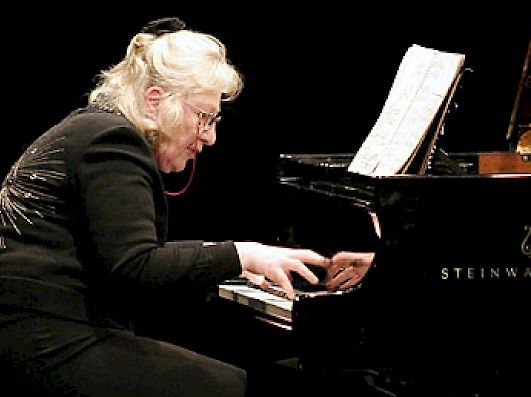by Mike Telin

On Friday, April 6 at 8:00 pm in Warner Concert Hall, pianist Ursula Oppens will join the Oberlin Contemporary Music Ensemble for a performance of Harvey’s colorful work which features the sounds of 40 Californian birds, including the indigo bunting, orchard oriole, and the golden crowned sparrow. Under the direction of Timothy Weiss, the program also includes Christopher Stark’s True North, Steve Reich’s New York Counterpoint, Jesse Jones’ Snippet Variations, and Lee Hyla’s Polish Folk Songs. The concert will be streamed here. Oppens will also present a master class on Wednesday, April 4 from 6:00 to 8:00 pm in the Conservatory’s Bibbins Hall, room 224. Both events are free.
Oppens, who has long been admired for her insightful interpretation of new music as well as standard repertoire, said that she first listened to Harvey’s concerto at the suggestion of Timothy Weiss. “Some years ago I played the Ligeti concerto with Tim and the Contemporary Music Ensemble,” the pianist said during a telephone conversation from her home in New York. “I was doing some teaching at Oberlin last year and he suggested that we do something together again. First he suggested the Ligeti because it had been quite a few years. He also suggested this piece, so I listened to it and it was love at first hearing.”
It may have been love, but the pianist said that she had no idea how complicated the electronics were until she saw the score. The 30-minute work, which requires the soloist to play both piano and sampler/synthesizer, is scored for an ensemble of 17 players and live electronics. “There are wonderful people at Oberlin who are preparing the technology, but it takes four people to play that part. While I do have a certain amount of control over the sampler, they control a great deal more.”
As many know, technology becomes obsolete very quickly, and a lot of the concerto’s electronic material needed to be transferred from one system to another. “The type of sampler I’m playing on has not been made in about ten years, Luckily, Oberlin still had one,” Oppens noted. “Abby Aresty and her assistants have done amazing work in updating the technology. I guess that one of the next adventures will be creating technology that can exist over time.”
The pianist said that while she has used very little electronic technology over the years, she has always been entranced by it. “Several people have written pieces where I play a midi piano with a sampler and a computer. I find live electronics to be extremely exciting, but I don’t really understand them.”
One of many aspects of Harvey’s work that Oppens finds attractive is the way he integrates electronics into the music. “I don’t have to play with a tape,” she said. “The sampler has about ten different settings, so if I play a B-flat on the sampler with one setting it will produce a certain bird sound, but if I play a B-flat with a different setting it was produce a different sound.”
The work requires a team of technical assistants who act as performers. They control ring modulators, panning the sound through an eight-speaker surround system. They also control sound processing techniques — not just for the synthesizer but also for the instruments within the ensemble.
Oppens said that Bird Concerto with Pianosong is unlike any piece she has ever played or heard. “The relationship between the instruments and bird calls is so lively. It’s just thrilling, and we were all quite giddy after the rehearsal yesterday. If you live in the Cleveland area, it is worth the drive to go to the concert. It is special, and to hear it live will be very different from hearing it on a recording.”
During her long career, Ursula Oppens has premiered works by such composers as Luciano Berio, William Bolcom, John Corigliano, John Harbison, Julius Hemphill, Tania Leon, Harold Meltzer, György Ligeti, Witold Lutoslawski, Conlon Nancarrow, and Charles Wuorinen. The pianist offered some sage advice concerning the commissioning of works.
“I can only imagine the last piece a composer wrote, but the composer is thinking about the next piece,” she said. When you commission a piece, to say ‘I want something,’ just won’t work. You have to think, ‘I want to be surprised.’ When Frederick Rzewski wrote The People United Will Never Be Defeated, I have to say that I did not expect an hour-long piece. I hadn’t asked for one. Yet it’s one of the masterpieces of the 20th century. You need to approach a new piece with an open mind and a suspension of disbelief. I have always tried to let the composer do whatever he or she feels like doing, and I think that’s why I’ve been so lucky in getting so many wonderful pieces.” What is the next new work for Oppens? A piano quintet written for her and the Cassatt Quartet by Laura Kaminsky to be premiered next season.
A composer Oppens had a long and fruitful association with was Elliott Carter, and one of her most cherished commissions was his Quintet for Piano and String Quartet that was written for her and the Arditti Quartet. “I have to tell you, that when I got home today from rehearsing the Harvey, I thought — I haven’t had so much fun since I was rehearsing the Carter Quintet with the Arditti — I really did. So, there you have it. And yes, grappling with music like those pieces takes a ton of work, but it is so exciting.”
Published on ClevelandClassical.com April 3, 2018.
Click here for a printable copy of this article


